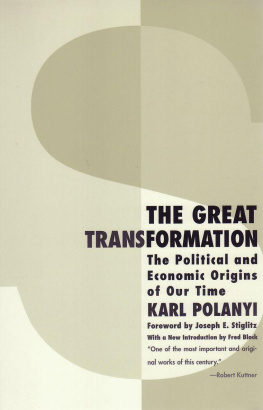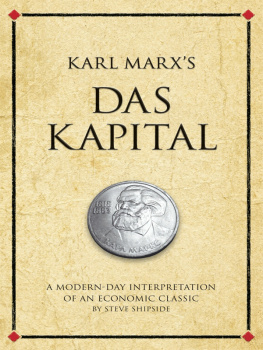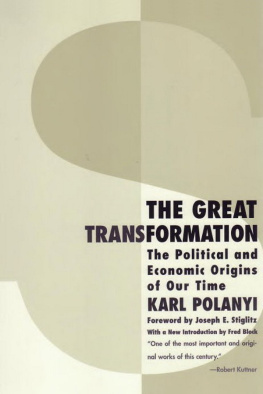Polanyi Karl - Karl Polanyi: the limits of the market
Here you can read online Polanyi Karl - Karl Polanyi: the limits of the market full text of the book (entire story) in english for free. Download pdf and epub, get meaning, cover and reviews about this ebook. City: Cambridge, Malden (MA), year: 2011, publisher: Polity;Wiley, genre: Politics. Description of the work, (preface) as well as reviews are available. Best literature library LitArk.com created for fans of good reading and offers a wide selection of genres:
Romance novel
Science fiction
Adventure
Detective
Science
History
Home and family
Prose
Art
Politics
Computer
Non-fiction
Religion
Business
Children
Humor
Choose a favorite category and find really read worthwhile books. Enjoy immersion in the world of imagination, feel the emotions of the characters or learn something new for yourself, make an fascinating discovery.
- Book:Karl Polanyi: the limits of the market
- Author:
- Publisher:Polity;Wiley
- Genre:
- Year:2011
- City:Cambridge, Malden (MA)
- Rating:5 / 5
- Favourites:Add to favourites
- Your mark:
- 100
- 1
- 2
- 3
- 4
- 5
Karl Polanyi: the limits of the market: summary, description and annotation
We offer to read an annotation, description, summary or preface (depends on what the author of the book "Karl Polanyi: the limits of the market" wrote himself). If you haven't found the necessary information about the book — write in the comments, we will try to find it.
Polanyi Karl: author's other books
Who wrote Karl Polanyi: the limits of the market? Find out the surname, the name of the author of the book and a list of all author's works by series.
Karl Polanyi: the limits of the market — read online for free the complete book (whole text) full work
Below is the text of the book, divided by pages. System saving the place of the last page read, allows you to conveniently read the book "Karl Polanyi: the limits of the market" online for free, without having to search again every time where you left off. Put a bookmark, and you can go to the page where you finished reading at any time.
Font size:
Interval:
Bookmark:

Key Contemporary Thinkers series
Jeremy Ahearne, Michel de Certeau
Michael Caesar, Umberto Eco
M. J. Cain, Fodor
Filipe Carreira da Silva, G. H. Mead
Rosemary Cowan, Cornel West
George Crowder, Isaiah Berlin
Gareth Dale, Karl Polanyi
Maximilian de Gaynesford, John McDowell
Reidar Andreas Due, Deleuze
Eric Dunning, Norbert Elias
Matthew Elton, Daniel Dennett
Chris Fleming, Ren Girard
Edward Fullbrook and Kate Fullbrook, Simone de Beauvoir
Andrew Gamble, Hayek
Neil Gascoigne Richard Rorty
Nigel Gibson, Fanon
Graeme Gilloch, Walter Benjamin
Karen Green, Dummett
Espen Hammer, Stanley Cavell
Christina Howells, Derrida
Fred Inglis, Clifford Geertz
Simon Jarvis, Adorno
Sarah Kay, iek
Valerie Kennedy, Edward Said
Chandran Kukathas and Philip Pettit, Rawls
Moya Lloyd, Judith Butler
James McGilvray, Chomsky
Lois McNay, Foucault
Dermot Moran, Edmund Husserl
Michael Moriarty, Roland Barthes
Stephen Morton, Gayatri Spivak
Harold W. Noonan, Frege
James OShea, Wilfrid Sellars
William Outhwaite, Habermas: Second Edition
Kari Palonen, Quentin Skinner
John Preston, Feyerabend
Chris Rojek, Stuart Hall
William E. Scheuerman, Morgenthau
Severin Schroeder, Wittgenstein
Susan Sellers, Hlne Cixous
Wes Sharrock and Rupert Read, Kuhn
David Silverman, Harvey Sacks
Dennis Smith, Zygmunt Bauman
James Smith, Terry Eagleton
Nicholas H. Smith, Charles Taylor
Felix Stalder, Manuel Castells
Geoffrey Stokes, Popper
Georgia Warnke, Gadamer
James Williams, Lyotard
Jonathan Wolff, Robert Nozick
Copyright Gareth Dale 2010
The right of Gareth Dale to be identified as Author of this Work has been asserted in accordance with the UK Copyright, Designs and Patents Act 1988.
First published in 2010 by Polity Press
Polity Press
65 Bridge Street
Cambridge CB2 1UR, UK
Polity Press
350 Main Street
Malden, MA 02148, USA
All rights reserved. Except for the quotation of short passages for the purpose of criticism and review, no part of this publication may be reproduced, stored in a retrieval system, or transmitted, in any form or by any means, electronic, mechanical, photocopying, recording or otherwise, without the prior permission of the publisher.
ISBN-13: 978-0-7456-4071-6 (hardback)
ISBN-13: 978-0-7456-4072-3 (paperback)
ISBN-13: 978-0-7456-5826-1 (Single-user ebook)
ISBN-13: 978-0-7456-5825-4 (Multi-user ebook)
A catalogue record for this book is available from the British Library.
The publisher has used its best endeavours to ensure that the URLs for external websites referred to in this book are correct and active at the time of going to press. However, the publisher has no responsibility for the websites and can make no guarantee that a site will remain live or that the content is or will remain appropriate.
Every effort has been made to trace all copyright holders, but if any have been inadvertently overlooked the publisher will be pleased to include any necessary credits in any subsequent reprint or edition.
For further information on Polity, visit our website: www.politybooks.com
Preface
This book is a critical introduction to the work of Karl Polanyi. It provides an exposition of his key texts and presents a range of criticisms of his principal theses. Its origins lie in my interest in Polanyis method. He meshes concepts from a variety of sociological and political-economic traditions to produce his own distinctive approach, but which ones was he appropriating and to what uses was he putting them? As I engaged more intensively with his works that sense of puzzlement began to recede. In its place there arose an admiration for the depth, breadth and originality of his intellectual engagement, albeit coupled with a greater awareness of its shortcomings in a number of areas, both empirical and theoretical. This book, then, is written from a broadly sympathetic yet critical standpoint.
During the first stages of my research it was at once apparent that no full-length general introduction to Polanyis work yet existed. There is one useful and well-researched monograph, Ron Stanfields The Economic Thought of Karl Polanyi (1986), but as the title indicates its focus is upon economic thought, and this, although indubitably the centre of Polanyis attention, was not his sole concern. Rather than giving a critical exposition of Polanyis ideas, moreover, Stanfield tends to bend them towards his own neo-Veblenian framework. In addition, his book has by now become dated. In the intervening decades a profusion of new primary materials and secondary literature has been published, the world has turned, and Polanyi has gained new and wider audiences. Apart from Stanfields, the only other monographs that even partially occupy the terrain of this book are Allen Sievers Critique of Karl Polanyis New Economics (1949) and Gregory Baums Karl Polanyi on Ethics and Economics (1996), but neither is similar in purpose or character to this book. The former is a polemical critique, not a critical introduction, and anteceded the publication of all but one of its subjects own books. The latter is an extended essay containing Polanyian meditations on theology and ethics.
In Karl Polanyi: The Limits of the Market I aspire to a comprehensive treatment of Polanyis work, but for reasons of space have omitted a number of topics. These I discuss elsewhere. They include, first and foremost, his political and intellectual formation in Hungary
In addition to Polanyis published works, interviews with his daughter Kari Polanyi-Levitt, and the secondary literature of which a trio of volumes from the early 1990s, edited by Polanyi-Levitt (1990), by Marguerite Mendell and Daniel Sale (1991) and by Kenneth McRobbie (1994), are the most valuable I have relied heavily upon texts archived at the Karl Polanyi Institute of Political Economy at Concordia University. It is thanks above all to my research there that I came to recognize the inadequacies of prevailing interpretations of Polanyis oeuvre, given that they rely for the most part upon such a limited range of his published (and mainly English-language) works. In what follows, citations that begin with numerals in the form 1-11 are of folders and files in the Polanyi archive. Wherever possible I have included the dates of documents, and where I have made repeated use of a major text from the archive I have included it in the references. Translations from German sources, published and unpublished, are my own.
Karl Polanyi was an institutionalist, and it is perhaps fitting that, when turning to thank those who have helped this book on its way, I begin with an institution. The archive of the Karl Polanyi Institute was, as already mentioned, the source of all of the unpublished materials cited as well as a good many published ones. Containing draft manuscripts, correspondence with colleagues and friends, outlines of projected books, notes, memorabilia, part of Polanyis own library, and a cornucopia of other treasures, it is an indispensable resource and one, moreover, that is well organized and welcoming. It is, then, to its co-founder, its administrator and its director respectively, Kari Polanyi-Levitt, Ana Gomez and Margie Mendell that I have incurred the greatest debts. I have also had the pleasure of attending two of the international Karl Polanyi conferences that the Institute has organized in recent years, in Istanbul and Montral. To Kari, in addition, I express my gratitude for her willingness to sit unflaggingly through interview after interview, in Montral and by telephone, over the course of nearly three years. Thanks are also due to Mathieu and Frdrique Denis, who helped to make my sojourns in Montral so welcoming and enjoyable, and to Brunel Universitys Business School and School of Social Sciences, which financed my conference and research trips.
Font size:
Interval:
Bookmark:
Similar books «Karl Polanyi: the limits of the market»
Look at similar books to Karl Polanyi: the limits of the market. We have selected literature similar in name and meaning in the hope of providing readers with more options to find new, interesting, not yet read works.
Discussion, reviews of the book Karl Polanyi: the limits of the market and just readers' own opinions. Leave your comments, write what you think about the work, its meaning or the main characters. Specify what exactly you liked and what you didn't like, and why you think so.













